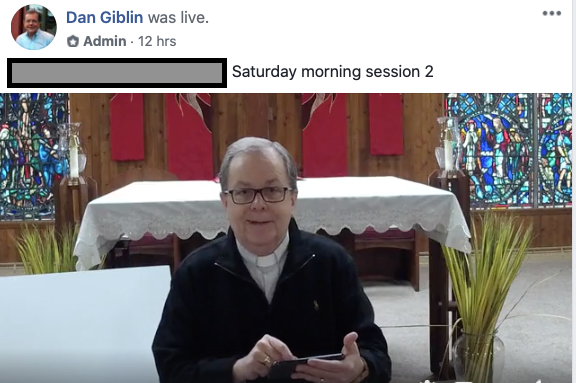
Permanent Deacon Dan Giblin of St. Ann Parish in Phoenixville conducted an online weekend retreat earlier this month for those in addiction recovery. A Pennsylvania state-certified recovery specialist and spiritual director at an archdiocesan behavioral treatment center, Deacon Giblin said the area’s recovery community has embraced online support during the coronavirus pandemic, which has seen spikes in alcohol sales and consumption. (Photo courtesy of Deacon Dan Giblin)
A Chester County permanent deacon is taking addiction recovery online, as coronavirus stay-at-home orders have suspended in-person support meetings.
Deacon Dan Giblin of St. Ann Parish in Phoenixville hosted a three-day virtual weekend retreat earlier this month, using Facebook and Zoom to help attendees hold fast to their sobriety.
The sessions featured livestreamed workshops conducted from the sanctuary of St. Ann’s by Deacon Giblin, a Pennsylvania state-certified recovery specialist.
“The camera was the window for me to the retreatants,” said Deacon Giblin, who is a full-time spiritual advisor at the St. John Vianney Center in Downingtown. The archdiocesan facility provides behavioral counseling and addictive disease treatment for clergy and religious nationwide.
[hotblock]
With the pandemic’s spread, dozens of scheduled recovery retreats throughout the mid-Atlantic area were cancelled, said Deacon Giblin.
“I could see messages online from people asking, ‘What are we going to do?’ he said. “It became a layered problem on top of the virus.”
Social distancing and lockdown orders have compounded the sense of isolation that can trigger substance abuse, while making it difficult to access recovery resources.
Alcohol sales alone have soared during the pandemic, rising 55% in the week ending March 21 according to Nielsen, a major market research firm. Liquor, spirits and pre-mixed cocktail purchases were up 75%, followed by wine and beer at 66% and 42% respectively.
The coronavirus has given rise to online happy hours and “quarantini” drinks, often touted by celebrities, which have popularized consuming alcoholic beverages throughout the day and evening.
Behavioral health specialists have cautioned that public health measures designed to counter the spread of the virus could in fact work to deepen addiction. The World Health Organization (WHO) recommended “(avoiding) alcohol altogether” during the COVID-19 crisis to protect personal and social health.
[tower]
While acknowledging the increased risks of abuse at this time, Deacon Gilbin pointed out that “there’s always grace in these things, in some way.”
He focused on taking a positive approach to the in-person retreat cancellations, and decided to work on “making the isolation a retreat experience.”
After proposing the online retreat in a video post to several Facebook groups, Deacon Giblin had more than 100 sign-ups within 48 hours. Some 90 additional individuals enrolled after being invited by initial registrants.
Participants joined “from New York to Texas,” said Deacon Giblin, noting that for many, the online sessions were “the first retreat they ever attended.”
A longtime retreat director, he crafted an agenda that began with an introductory session on Friday evening, three workshops at various times on Saturday, and a closing session on Sunday. An Alcoholics Anonymous (AA) meeting was also organized for attendees on the Zoom platform.
The format largely followed those used by the popular Matt Talbot Retreat Movement, which focus on spiritual healing from addiction. Open to participants of all faiths, the approach takes its inspiration from Venerable Matt Talbot (1856-1925), an Irish laborer who conquered severe alcoholism through a profound reliance on his Catholic spirituality, years before the principles of AA and other 12-step recovery programs had been developed.
Deacon Giblin said that one of the immediate challenges was helping participants find privacy amid close quarters with other family members.
“I encouraged them to find some space in the house by themselves, or some quiet time,” he said, adding that the goal was ultimately to stress “an individual commitment to time with God, and time away from daily life.”
[hotblock2]
He also recommended that retreatants simplify and sanctify that space with “a chair, a table, an inspirational picture and some reading materials” on recovery and spirituality.
Between sessions, he suggested that participants “turn off Netflix” and “spend time alone with themselves.”
Based on the feedback he received, the message and the medium succeeded.
“The recovery community as a whole has rallied around digital resources such as Zoom to provide the real-time contact so necessary” to those seeking healing from addiction, said Deacon Giblin.
He pointed out that the “vibrant online recovery community” now includes “hundreds of Zoom meetings almost 24 hours a day” for sobriety support.
In many ways, he observed, those in recovery are uniquely qualified to respond well to crises such as the coronavirus pandemic, given their self-awareness and their reliance on healthy coping strategies to counter stress.
“After World War II, a lot of guys came back and didn’t lose their sobriety,” said Deacon Gilbin.
For all its widescale disruption, the pandemic “is not an excuse for self-destructive behaviors or substances,” he said.
On the whole, many in area sobriety groups are endorsing that perspective by “reaching out and sharing phone numbers” to keep each other focused and accountable during this period, said Deacon Giblin.
And for some, the coronavirus has become a moment of decision.
“I’ve even seen people get sober during this time,” he said.
PREVIOUS: The young shop for elders to keep them safe from virus
NEXT: Congratulations to Philadelphia priest jubilarians of 2020


Share this story